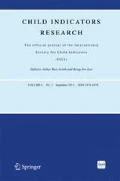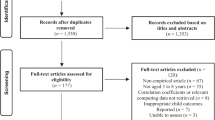Abstract
The present studies aimed at investigating whether children’s risk for self-regulatory failure implicates poor academic outcomes even before the start of formal instruction. Therefore, we analyzed the association between children’s self-regulation abilities (i.e., operationalized with different paradigms) and academic achievement (i.e., early math skills). In Study 1, we found that parent-rated self-regulation predicted early math skills in preschool children. Additionally, the time that children managed to successfully delay a response predicted early math skills. In Study 2, we found that self-regulated behavior in preschool children as measured in a newly developed computerized delay task predicted early math skills. The results are discussed with respect to the importance of children’s self-regulation abilities for successful academic achievement.
Similar content being viewed by others
Notes
The German preschool is known as kindergarten. Children between the ages of three and six attend kindergartens that are not part of the German school system. For ease of exposition we refer to these institutions as preschools in the present paper.
References
American Psychiatric Association. (2000). Diagnostic and statistical manual of mental disorders (text rev.) (4th ed.). Washington: Author.
Barkley, R. A. (1997). Behavioral inhibition, sustained attention, and executive functions: Constructing a unifying theory of ADHD. Psychological Bulletin, 121(1), 65–94. doi:10.1037/0033-2909.121.1.65.
Barkley, R. A. (1998). Attention-deficit hyperactivity disorder: A handbook for diagnosis and treatment (2nd ed.). New York: The Guilford Press.
Barnett, W. S., Jung, K., Yarosz, D. J., Thomas, J., Hornbeck, A., Stechuk, R., & Burns, S. (2008). Educational effects of the tools of the mind curriculum: a randomized trial. Early Childhood Research Quarterly, 23(3), 299–313. doi:10.1016/j.ecresq.2008.03.001.
Bauer, I. M., & Baumeister, R. F. (2011). Self-regulatory strength. In K. D. Vohs & R. F. Baumeister (Eds.), Handbook of self- regulation (2nd ed., pp. 64–82). New York: Guilford.
Beaman, R., Wheldall, K., & Kemp, C. (2006). Differential teacher attention to boys and girls in the classroom. Educational Review, 58(3), 339–366. doi:10.1080/00131910600748406.
Bickel, W. K., & Marsch, L. A. (2001). Toward a behavioral economic understanding of drug dependence: delay discounting processes. Addiction, 96, 73–86. doi:10.1046/j.1360-0443.2001.961736.x.
Blair, C., & Razza, R. P. (2007). Relating effortful control, executive function, and false belief understanding to emerging math and literacy ability in kindergarten. Child Development, 78(2), 647–663. doi:10.1111/j.1467-8624.2007.01019.x.
Bodrova, E., & Leong, D. J. (2007). Tools of the mind: The Vygotskian approach to early childhood education (2nd ed.). New York: Pearson.
Breuer, D., & Döpfner, M. (2008). Entwicklung eines Fragebogens zur Erfassung von Aufmerksamkeitsdefizit-/Hyperaktivitätsstörungen (ADHS) bei Vorschulkindern im Eltern- und im Erziehungsurteil. [Age-adjusted ADHD symptom-checklist for kindergarten and preschool children]. Zeitschrift für Entwicklungspsychologie und Pädagogische Psychologie, 40(1), 40–48. doi:10.1026/0049-8637.40.1.40.
Cameron Ponitz, C., McClelland, M. M., Matthews, J. S., & Morrison, F. J. (2009). A structured observation of behavioral self-regulation and its contribution to kindergarten outcomes. Developmental Psychology, 45(3), 605–619. doi:10.1037/a0015365.
Clark, C. A. C., Pritchard, V. E., & Woodward, L. J. (2010). Preschool executive functioning abilities predict early mathematics achievement. Developmental Psychology, 46(5), 1176–1191. doi:10.1037/a0019672.
Diamond, A., & Lee, K. (2011). Interventions shown to aid executive function development in children 4 to 12 years old. Science, 333(6045), 959–964. doi:10.1126/science.1204529.
Döpfner, M., Görtz, A., & Lehmkuhl, G. (2006). Diagnostik-System für Psychische Störungen im Kindes- und Jugendalter nach ICD-10 und DSM-IV (DISYPS-II) (3. korrigierte und ergänzte Aufl.) [Diagnostic system for psychiatric disorders in childhood and adolescence, 3rd amended ed.]. Bern: Huber.
Duckworth, A. L. (2011). The significance of self-control. PNAS, 108(7), 2639–2640. doi:10.1073/pnas.1019725108.
Duckworth, A. L., & Seligman, M. E. P. (2005). Self-discipline outdoes IQ in predicting academic performance of adolescents. Psychological Science, 16(12), 939–944. doi:10.1111/j.1467-9280.2005.01641.x.
DuPaul, G. J., & Stoner, G. (2003). ADHD in the schools: Assessment and intervention strategies (2nd ed.). New York: The Guilford Press.
Frazier, T. W., Youngstrom, E. A., Glutting, J. J., & Watkins, M. W. (2007). ADHD and achievement: meta-analysis of the child, adolescent, and adult literatures and a concomitant study with college students. Journal of Learning Disabilities, 40(1), 49–65. doi:10.1177/00222194070400010401.
Friedman, N. P., Miyake, A., Robinson, J. L., & Hewitt, J. K. (2011). Developmental trajectories in toddlers’ self-restraint predict individual differences in executive functions 14 years later: a behavioral genetic analysis. Developmental Psychology, 47(5), 1410–1430. doi:10.1037/a0023750.
Gawrilow, C., Gollwitzer, P. M., & Oettingen, G. (2011). If-then plans benefit delay of gratification performance in children with and without ADHD. Cognitive Therapy and Research, 35(5), 442–455. doi:10.1007/s10608-010-9309-z.
Grant, D. A., & Berg, E. (1948). A behavioral analysis of degree of reinforcement and ease of shifting to new responses in a Weigl-type card-sorting problem. Journal of Experimental Psychology, 38, 404–411.
Hughes, C. (2011). Changes and challenges in 20 years of research into the development of executive functions. Infant and Child Development, 20, 251–271. doi:10.1002/icd.736.
Kacker, R. N., Forbes, A., Kessel, R., & Sommer, K.-D. (2008). Bayesian posterior predictive p-value of statistical consistency in interlaboratory evaluations. Metrologia, 45, 512–523. doi:10.1088/0026-1394/45/5/004.
Karatekin, C. (2004). A test of the integrity of the components of Baddeley’s model of working memory in ADHD. Journal of Child Psychology and Psychiatry, 45, 912–926.
Kaufman, A. S., Kaufman, N. L., Melchers, P., & Preuß, U. (2006). K-ABC Kaufman assessment battery for children – German version. Göttingen: Hogrefe.
Klingberg, T., Fernell, E., Olesen, P. J., Johnson, M., Gustafsson, P., Dahlstroem, K., Gillberg, C. G., Forssberg, H., & Westerberg, H. (2005). Computerized training of working memory in children with ADHD: A randomized, controlled trial. Journal of the American Academy of Child and Adolescent Psychiatry, 44, 177–186.
Krajewski, K., & Schneider, W. (2009). Exploring the impact of phonological awareness, visual-spatial working memory, and preschool quantity-number competencies on mathematics achievement in elementary school: findings from a 3-year longitudinal study. Journal of Experimental Child Psychology, 103(4), 516–531. doi:10.1016/j.jecp.2009.03.009.
Kruschke, J. K. (2011). Bayesian assessment of null values via parameter estimation and model comparison. Perspectives on Psychological Science, 6, 299–312. doi:10.1177/1745691611406925.
Lijffijt, M., Kenemans, J. L., Verbaten, M. N., & van Engeland, H. (2005). A meta-analytic review of stopping performance in attention-deficit/hyperactivity disorder: Deficient inhibitory motor control? Journal of Abnormal Psychology, 114(2), 216–222. doi:10.1037/0021-843X.114.2.216
Li-Grining, C. P., Votruba-Drzal, E., Maldonado-Carreño, C., & Haas, K. (2010). Children’s early approaches to learning and academic trajectories through fifth grade. Developmental Psychology, 46(5), 1062–1077. doi:10.1037/a0020066.
Marco, R., Miranda, A., Schlotz, W., Melia, A., Mulligan, A., Müller, U., et al. (2009). Delay and reward choice in ADHD: an experimental test of the role of delay aversion. Neuropsychology, 23(3), 367–380. doi:10.1037/a0014914.
Martinussen, R., Hayden, J., Hogg-Johnson, S., & Tannock, R. (2005). A meta-analysis of working memory impairments in children with ADHD. Journal of the American Academy of Child and Adolescent Psychiatry, 44, 377–384.
Martinussen, R., & Tannock, R. (2006). Working memory impairments in children with ADHD with and without comorbid language learning disorders. Journal of Clinical and Experimental Neuropsychology, 28, 1073–1094
McClelland, M. M., Connor, C. M., Farris, C. L., Jewkes, A. M., & Morrison, F. J. (2007). Links between behavioral regulation and preschoolers’ literacy, vocabulary, and math skills. Developmental Psychology, 43, 947–959. doi:10.1037/0012-1649.43.4.947.
Metcalfe, J., & Mischel, W. (1999). A hot/cool-system analysis of delay of gratification: dynamics of willpower. Psychological Review, 106(1), 3–19. doi:10.1037/0033-295X.106.1.3.
Mischel, W. (1958). Preference for delayed reinforcement: an experimental study of a cultural observation. Journal of Abnormal and Social Psychology, 56, 57–61. doi:10.1037/h0041895.
Mischel, W. (1974). Processes in delay of gratification. In L. Berkowitz (Ed.), Advances in social psychology (pp. 249–292). New York: Academic.
Mischel, W., Shoda, Y., & Peake, P. K. (1988). The nature of adolescent competencies predicted by preschool delay of gratification. Journal of Personality and Social Psychology, 54(4), 687–696. doi:10.1037/0022-3514.54.4.687.
Mischel, W., Shoda, Y., & Rodriguez, M. I. (1989). Delay of gratification in children. Science, 244(4907), 933–938. doi:10.1126/science.2658056.
Mischel, W., Ayduk, O., Berman, M. G., Casey, B. J., Gotlib, I. H., Jonides, J., et al. (2011). “Willpower” over the life span: decomposing self-regulation. Social Cognitive and Affective Neuroscience, 6(2), 252–256. doi:10.1093/scan/nsq081.
Morris, A. S., Silk, J. S., Steinberg, L., Myers, S. S., & Robinson, L. R. (2007). The role of the family context in the development of emotion regulation. Social Development, 16, 361–388. doi:10.1111/j.1467-9507.2007.00389.x.
Muthén, B. (2010). Bayesian analysis in Mplus: A brief introduction. Retrieved from http://www.statmodel.com/download/IntroBayesVersion%203.pdf.
Neubauer, A., Gawrilow, C., & Hasselhorn, M. (2012). The watch-and-wait task: on the reliability and validity of a new method to assess self-control in preschool children. Learning and Individual Differences, 22, 770–777. doi:10.1016/j.lindif.2012.05.006.
Rachlin, H., Raineri, A., & Cross, D. (1991). Subjective probability and delay. Journal of the Experimental Analysis of Behavior, 55(2), 233–244. doi:10.1901/jeab.1991.55-233.
Reynolds, B., & Schiffbauer, R. (2005). Delay of gratification and delay discounting: a unifying feedback model of delayed impulsive behavior. Psychological Record, 55, 439–460.
Reynolds, B., Richards, J. B., Horn, K., & Karraker, K. (2004). Delay discounting and probability discounting as related to cigarette smoking status in adults. Behavioural Processes, 65, 35–42. doi:10.1016/S0376-6357(03)00109-8.
Romine, C. B., Lee, D., Wolfe, M. E., Homack, S., George, C., Riccio, & Cynthia, A. (2004). Wisconsin card sorting test with children: a meta-analytic study of sensitivity and specificity. Archives of Clinical Neuropsychology, 19, 1027–1041.
Saft, E. W., & Pianta, R. C. (2001). Teachers’ perceptions of their relationships with students: effects of child age, gender, and ethnicity of teacher and children. School Psychology Quarterly, 16, 125–141. doi:10.1521/scpq.16.2.125.18698.
Scheres, A., Dijkstra, M., Ainslie, E., Balkan, J., Reynolds, B., Sonuga-Barke, E., & Castellanos, F. (2006). Temporal and probabilistic discounting of rewards in children and adolescents: effects of age and ADHD symptoms. Neuropsychologia, 44(11), 2092–2103. doi:10.1016/j.neuropsychologia.2005.10.012.
Shoda, Y., Mischel, W., & Peake, P. K. (1990). Predicting adolescent cognitive and self-regulatory competencies from preschool delay of gratification: identifying diagnostic conditions. Developmental Psychology, 26(6), 978–986. doi:10.1037//0012-1649.26.6.978.
Sinner, D., Ennemoser, M., & Krajewski, K. (2011). Entwicklungspsychologische Frühdiagnostik mathematischer Basiskompetenzen im Kindergarten- und frühen Grundschulalter (MBK-0 und MBK-1) [Developmental-psychological diagnosis of early math skills in kindergarten and early preschool]. In M. Hasselhorn & W. Schneider (Eds.), Frühprognose schulischer Kompetenzen [Early prediction of academic achievement] (pp. 109–126). Göttingen: Hogrefe.
Song, X.-Y., & Lee, S.-Y. (2008). A Bayesian approach for analyzing hierarchical data with missing outcomes through structural equation models. Structural Equation Modeling, 15, 272–300. doi:10.1080/10705510801922472.
Steinberg, L., Graham, S., O’Brien, L., Woolard, J., Cauffman, E., & Banich, M. (2009). Age differences in future orientation and delay discounting. Child Development, 80(1), 28–44.
Tangney, J. P., Baumeister, R. F., & Boone, A. L. (2004). High self-control predicts good adjustment, less pathology, better grades, and interpersonal success. Journal of Personality, 72(2), 271–324. doi:10.1111/j.0022-3506.2004.00263.x.
von Suchodoletz, A., Trommsdorff, G., Heikamp, T., Wieber, F., & Gollwitzer, P. M. (2009). Transition to school: the role of kindergarten children’s behavior regulation. Learning and Individual Differences, 19(4), 561–566. doi:10.1016/j.lindif.2009.07.006.
von Suchodoletz, A., Trommsdorff, G., & Heikamp, T. (2011). Linking maternal warmth and responsiveness to children’s self-regulation. Social Development, 20, 486–503. doi:10.1111/j.1467-9507.2010.00588.x.
WHO. (1991). Internationale Klassifikation psychischer Störungen: ICD 10, Kapitel V [Tenth revision of the international classification of diseases, Chapter V (F): Mental and behavioral disorders]. Bern: Huber.
Willcutt, E. G., & Carlson, C. L. (2005). The diagnostic validity of attention-deficit/hyperactivity disorder. Clinical Neuroscience Research, 5, 219–232. doi:10.1016/j.cnr.2005.09.003.
Author information
Authors and Affiliations
Corresponding author
Additional information
This research was partly funded by the Hessian initiative for the development of scientific and economic excellence (LOEWE, Study 1) and by a grant given to the research group “The Empirics of Education: Economic and Behavioral Perspectives” in the context of the German Excellence Initiative at the University of Freiburg (Study 2).
Rights and permissions
About this article
Cite this article
Gawrilow, C., Fäsche, A., Guderjahn, L. et al. The Impact of Self-Regulation on Preschool Mathematical Achievement. Child Ind Res 7, 805–820 (2014). https://doi.org/10.1007/s12187-013-9201-y
Accepted:
Published:
Issue Date:
DOI: https://doi.org/10.1007/s12187-013-9201-y




